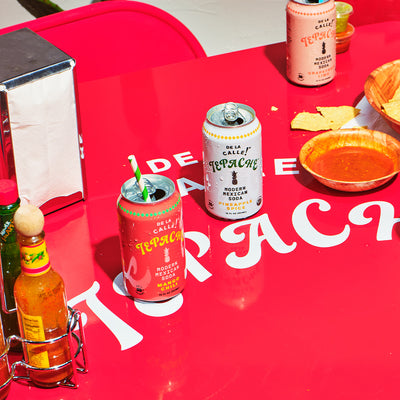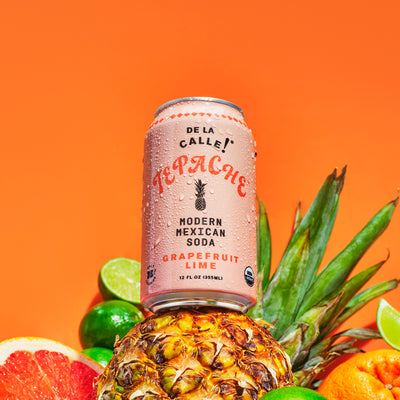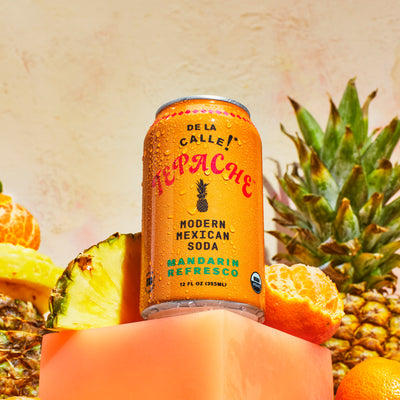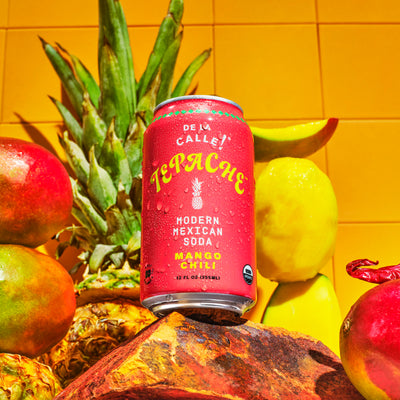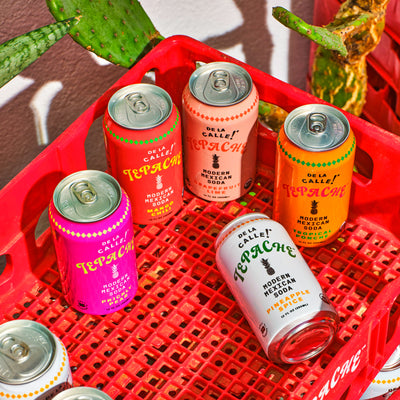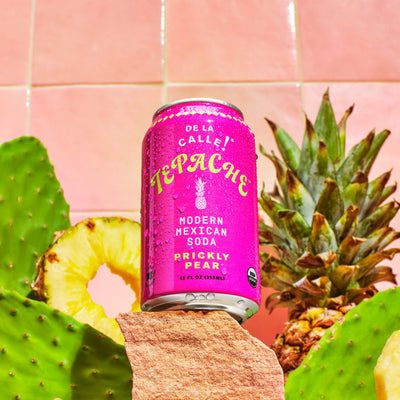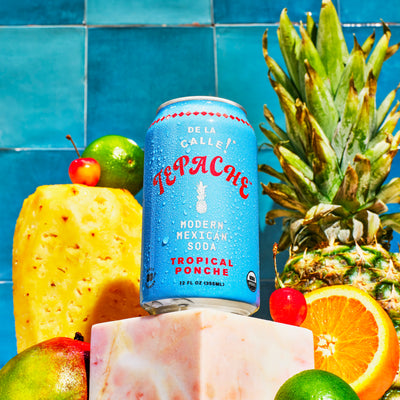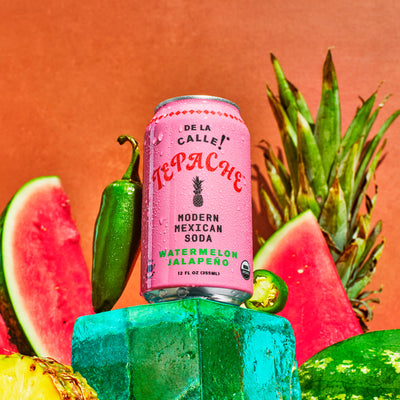Synergy Kombucha & De La Calle's Tepache: What Makes Them Different?

Tepache and kombucha are both fermented drinks with great health benefits. For this reason, you may be wondering what makes them different. If you are a fan of kombucha and have not tried its nutrient-rich relative, tepache, you need to! Here is the low-down on the difference between Synergy Kombucha and De La Calle’s tepache!
What Is Tepache?
Tepache is a delicious probiotic beverage that’s based on the traditions of pre-Colombian Mexico. Tepache is a regionally diverse refreshment made from pineapples and is naturally fermented and good for your gut.
De La Calle’s versions echo the drinks that have been made for generations, bringing flavor combinations unique to the different areas all over Mexico where tepache is crafted and celebrated.
The History of Tepache
Tepache is one of the most traditional and beloved drinks found in Mexico.
In Central Mexico, locals have been fermenting pineapple into this refreshing concoction for centuries. In Mayan culture, it was considered a sacred drink. The Maya would often add different aromatics and herbs to its preparation. In fact, thousands of recipes for tepache exist. There are countless variations to the drink.
The recipes have been passed down for generations and vary depending on the region they originate from. Tepache is a unique drink. This is because the ingredients change based on whether or not there are certain ingredients available to each locale.
You can buy cold baggies of tepache on the streets of many Mexican cities for a cool, refreshing treat. De La Calle takes this iconic beverage and adds in unique regional flavors from around Mexico, creating combinations that are somehow nostalgic and modern at the same time.
What Is in De La Calle’s Tepache?
De La Calle uses organic ingredients. De La Calle’s tepache is made from pineapple rinds as well as a blend of spices and aromatics. De La Calle’s tepache only uses organic pineapples grown right in the heart of Mexico, where over 540,000 tons of fresh fruit is grown every year. These organic pineapples are the base of their tepache.
Many attributes of tepache actually make it healthier than kombucha. Depending on the flavor, some kombuchas can have up to 28 grams of sugar in them. Tepache uses clean and simple ingredients.
What Is Kombucha?
Kombucha tea is made by adding a colony of bacteria and yeast to sugar and tea. Then, one allows the mix to ferment using the SCOBY. The resulting liquid contains vinegar, B vitamins, and a number of other chemical compounds. There are health benefits to drinking kombucha, including those benefits associated with the consumption of probiotics which promote good gut health.
The History of Kombucha
Kombucha originated in Northeast China around 220 B.C. The beverage, much like tepache to the Maya, was revered for healing or sacred properties. It supposedly received its name from Dr. Kombu, a Korean physician who introduced the tea to Japan. This kombucha tea was initially intended as a remedy for Emperor Inkyo.
In that sense, both kombucha and tepache were revered for their health benefits. However, tepache was a drink commonly sold and enjoyed on the streets, a more casual and common beverage. Kombucha was initially procured for the elites.
What Is in Synergy Kombucha?
The main deviation in the formulas for kombucha and tepache is the addition of sugar and the use of juices rather than water and pineapple peels.
Golden Pineapple Synergy Kombucha contains GT's Kombucha (kombucha culture, black tea, green tea, kiwi juice), pineapple juice, lemon juice, and sage. It contains 16 grams of sugar. It also has caffeine as derived from black and green tea.
How Is De La Calle’s Tepache Not Like Synergy Kombucha?
While tepache and kombucha are both fermented bubbly beverages, there are many differences between them. Specifically, when comparing De La Calle’s tepache and Synergy Kombucha, they deviate in the following ways:
- Synergy Kombucha is bottled, while De La Calle’s tepache is canned.
- De La Calle’s tepache comes in five flavors, while Synergy Kombucha has over fifty flavors.
- Tepache is less overbearing in taste than kombucha.
- The serving size for De La Calle’s can is one serving per can. Synergy Kombucha is two servings per bottle.
- De La Calle’s tepache is naturally flavored.
- De La Calle’s tepache is naturally low in sugar.
- Unlike kombucha, which is made from tea, tepache doesn’t contain caffeine.
- De La Calle’s tepache does not require a SCOBY. SCOBY is a symbiotic culture of yeast and bacteria that aids in the fermentation process. Tepache ferments without the aid of a SCOBY.
- When you add a SCOBY into sweetened tea and let it ferment for 1–4 weeks, you get kombucha. De La Calle’s tepache only requires fermentation for three to four days.
- De La Calle’s tepache is made from pineapple peel as a base, while Synergy Kombucha is added to tea.
So Which Is Healthier? Synergy Kombucha or De La Calle’s Tepache?
Both drinks have great health benefits and suit different needs based on what you are looking to get out of your drink. Overall, De La Calle’s tepache has less sugar than kombucha. In addition, the lack of caffeine avoids any adverse effects that a consumer may get from consuming caffeine from kombucha.
Tepache is made up of pineapple pulp, spices, and brown sugar, which then ferments in barrels. It’s here that it gains the prebiotic and probiotic properties for which it’s so highly regarded.
Essentially, tepache and Kombucha have similarities in that they are both fermented and probiotic. However, tepache contains less sugar and is naturally flavored. A byproduct of De La Calle’s tepache is lactic acid which is great for your gut and less acetic than the acids found in kombucha. For this reason, tepache tends to have an easier, less overbearing taste profile than many kombucha flavors.
Both drinks are great alternatives to a high sugar soda. De La Calle is committed to preserving the tastes and traditions of authentic tepache. Tepache is great for a dinner with friends, a break between lunch and dinner, a walk through the park, or a moment of tranquility in the hustle and bustle of modern life. De La Calle’s tepache is all about feeling good about what you are drinking while you are drinking it.
Cheers to getting cultured with these probiotic beverages! Tepache is great for your tastebuds and your gut! The best food comes from the streets, and De La Calle’s tepache stays true to that authentic, delicious tradition!
Sources:
What do “Pre-Columbian” and “Mesoamerica” mean? | Khan Academy
5 Side Effects of Too Much Kombucha | Healthline
Kombucha SCOBY: What It Is and How to Make One | Healthline
Kombucha 101: Demystifying The Past, Present And Future Of The Fermented Tea Drink | Forbes

